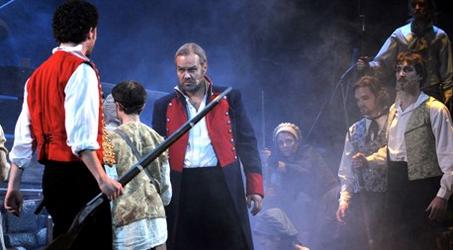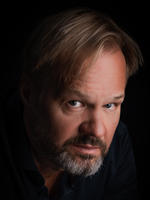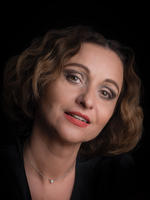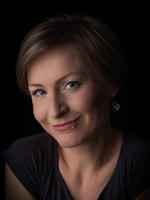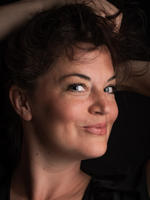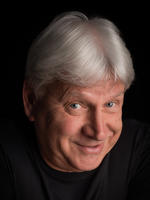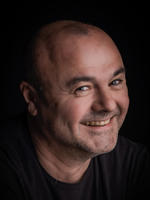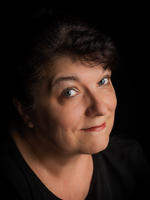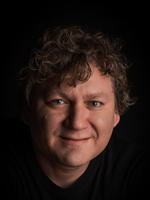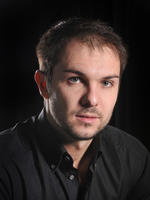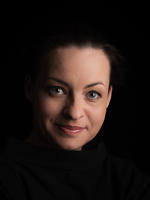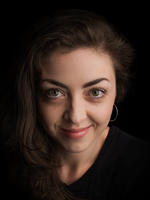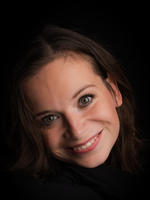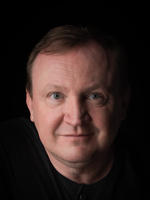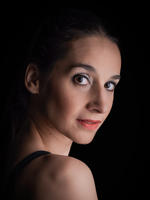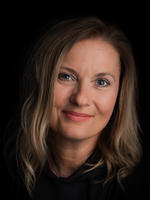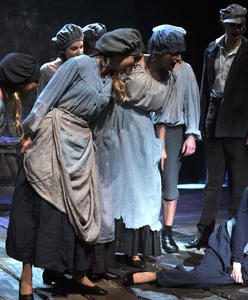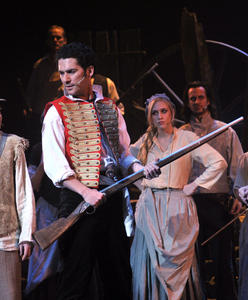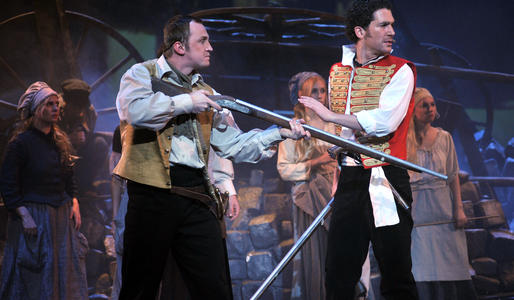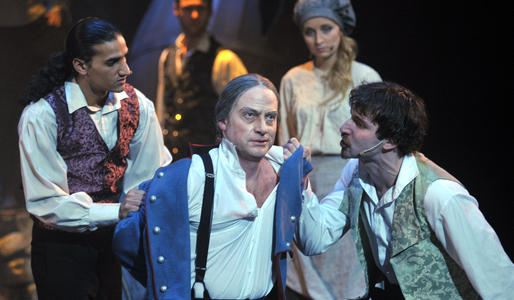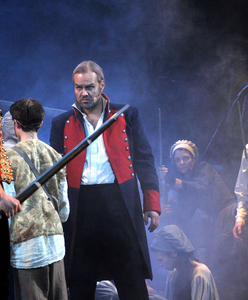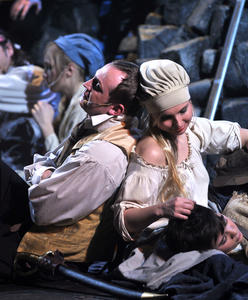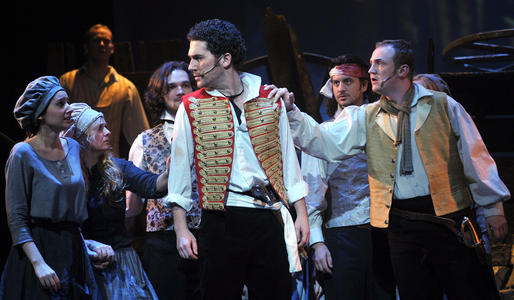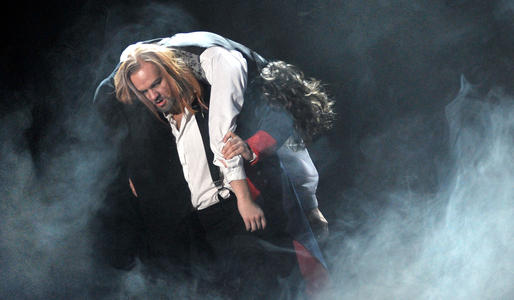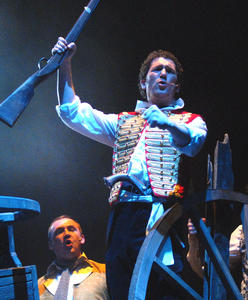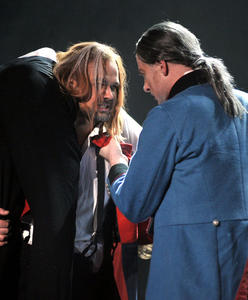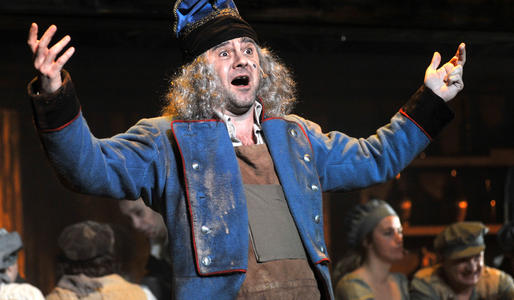LES MISÉRABLES
26. April 2011 zdroj Brněnský deník
LES MISÉRABLES
Brno City Theatre has released a complete studio recording of the legendary musical by Claude-Michel Schönberg and Alain Boublil, Les Misérables, which they have been performing at their Music Theatre since February 2009. The double album offers a total of forty-four tracks, among which can be found Czech versions of the famous hits from the musical such as Píseň samotářky (On My Own) , Hlava mazaná (Master of the House), Knížka snů (I Dreamed a Dream), Modlitba (Bring Him Home) and Tam ve hvězdách (Stars). Petr Gazdík is the voice of the central character, runaway galley slave Jean Valjean; Gazdík was awarded the Thalia Award for this role in 2009.
Les Miserables double album christened at the theatre
9. March 2011 zdroj MF Dnes
Les Miserables double album christened at the theatre
The famous story of galley slave Jean Valjean, which became world famous thanks to the musical Les Miserables, was yesterday presented as a recording by Brno City Theatre. The theatre christened a double album featuring its own recording of one of the most famous world musicals, Les Misérables, during its evening performance yesterday.
“The main godparents of this musical recording are Hana Holišová and Markéta Sedláčková, together with conductor Dan Kalousek,” said theatre spokeswoman Lucie Broučková. The complete recording contains forty-four songs spread across two CDs. The voice of the main character, Jean Valjean, is that of Petr Gazdík, who obtained the prestigious Thalia Award for this role last year.
This musical, which has already been shown in more than fifty cities worldwide, finally had its premiere at Brno City Theatre on 13th February 2009. Directed by Stanislav Moša, it has been seen by 53 178 spectators during eighty-four reprises to date. The production has received positive feedback both from critics and the audience.
The story of escaped galley slave Jean Valjean, which is based on a famous novel by Victor Hugo, first appeared in musical form in Paris in 1980. The musical became famous particularly after its premiere in London (1980) and on Broadway (1987), mainly thanks to British producer Cameron Mackintosh.
Les Misérables, Evita and the others
Vít Závodský 21. September 2009 zdroj Týdeník Rozhlas
In the works offered by the three-ensemble Brno City Theatre, three lines which complement one another can be traced. Perhaps the most obvious one, and perhaps the one most sought-after by theatregoers, is the systematically cultivated musical genre which developed significantly after the opening of the modern Music Stage five years ago. It has been constantly balancing original productions of world famous foreign titles (for example Oliver, The Witches of Eastwick or Fame) with undoubtedly beneficial domestic productions (World Full of Angels, Koločava, Nana, The Red and the Black, The Ballad of Love etc.). Plays from the drama repertoire (which we are leaving aside for today) which enjoy country-wide recognition include, for example, the productions In the Lion's Den, The Death of Paul I and The Three Musketeers.
It certainly isn't easy to bring renowned foreign musicals, limited by agency and producers' requirements, onto the stage of a "stone" theatre. However, the director and manager of Brno City Theatre, Stanislav Moša, is a very good manager with continental 'range' - part of the ensemble acts in parallel to the local one, making European tours or showing certain productions abroad before they are premiered in the Czech Republic. In contrast with many Prague projects, which are put together ad hoc, they have been betting on the discovery of young talents (some roles have up to four alternates) who have been trained by the Janacek Academy of Music and Performing Arts in synthetic drama acting. In the second half of the previous season, two successfully staged premieres of two proven musicals took place in short succession, and each of them deserves closer attention.
Moša fulfilled his artistic dream of many years by producing the work of Alain Boublil and Claude-Michel Schönberg, Les Misérables, with a great translation by Zdeněk Borovec. On a monumental, realistic rather than suggestive set by Christoph Weyers of Germany, and with period costumes by Andrea Kučerová, an impressive three-hour-long fresco based on Victor Hugo's work was created, with the contribution of a large orchestra that artfully combines the personal life stories of the noble convict Jean Valjean (Petr Gazdík alternates with Jan Ježek as a guest), the policeman Javert (Igor Ondříček, Petr Štěpán, Lukáš Vlček), Cosette (Radka Coufalová), the student Marius (Dušan Vitázek) and other characters. The socio-critical, sentimental and also moments of revolutionary pathos are all administered in very careful doses, at a very high professional interpretational level and with dynamic gradation.
The slightly older Evita by the famous tandem Tim Rice - Andrew Lloyd Webber, didn’t slip into kitschy likeability in Michal Prostějovský’s poetic translation, although it remained somewhat in the shade of the humanistic message of Les Misérables due to its more distant topic, epic structure as well as its more sober production approach. In his fifth cooperation with Brno City Theatre, the director and artist Pavel Fieber could use his experience with the German version. The story of the rise of the ambitious Eva Perón (Radka Coufalová, Hana Holišová) up to her position as the first lady of Argentina, loved by the masses, evolves quite coldly. It found a glossarist in the fictitious figure called Che (Ján Jackuliak, Stanislav Slovák, Dušan Vitázek), who contributes to the demasking of the background and political manipulations of the South American dictatorial regime.
Musical stardust
Luboš Mareček 10. April 2009 zdroj MF DNES
Les Misérables (1985) and Evita (1978). Two theatre hits, which in the last three decades have taken on the form of all-time musical blockbusters, were put on at Brno City Theatre within only a very short time of one another. Both works still have millions of fans all over the world. Aren't they spoiling Brno's theatregoers? Won't they be overfed? And logically dull-witted from their satiation?
Brno City Theatre thankfully has its feet in two camps in terms of its musical dramaturgy. Sweet delicacies such as the hit of all hits Jesus Christ Superstar or the Witches of Eastwick - theirs was the first performance of this work in the Czech Republic - are fired off at their public with the same verve as their authored works.
At Brno's Music Theatre, still known domestically since their opening in 2004 as the most modern, and justifiably as the most progressive, there is the ever-present ambition to create a theatre which authors its own performances.
For every ten new performances put on at Brno's theatre on Lidická Street, five are always dramas and five are musicals, for purely democratic reasons. A quick look at the next season elegantly shows where they are aiming with their musical dramaturgy. Before summer even arrives they are offering another original musical work prepared specially for Brno. The well-known composer and musician Daniel Fikejz, inspired by northern mythology, has provided an opus with the mysterious title Singoalla. Also in the category of original domestic opuses is the dusted off musical from their strongest working team, Moša-Merta, which reminds one of the worked over political satire Ptákoviny podle Aristofana ('Japery According to Aristophanes'). Season ticket holders won't be missing out in the area of hot foreign musicals either. The dramaturgical plan promises the ten-year-old rock musical Mozart!, which was first performed in Vienna and whose theme is most appropriate for performance in Brno.
This musical biography of the genius and composer is accompanied by what is perhaps the most impressive title in the new selection on offer: in November they will perform Spring Awakening. This once scandalous work by the German dramatist Frank Wedekind about growing up, sex and inflexible morality was transformed overseas into libretto and notes. Spring Awakening had its off-Broadway premiere in July 2006 in New York, and in December it already moved straight to Broadway. Do you love prestige statistics? Spring Awakening gained eleven nominations for the prestigious TONY awards, from which it really gained eight, for example in the categories of Best Musical, Direction, Score and Featured Actor. So, we can really look forward to this autumn's musicals in Brno. The set of five new titles of the 'timeless evergreen hit' dramaturgical variety is completed by the narrative musical Hello, Dolly! This return of a legend is connected with the post-pregnancy comeback of Alena Antalová, so lovers of the golden classics and the on-stage artistry of this beautiful mother-of-three have a real treat in store.
Let us return, however, to the Brno performance of the popular Les Misérables. Based on Victor Hugo's legendary novel, the show had its premiere mid-February and only six weeks later was followed by the musical tale about Eva Peron, wife of an Argentine dictator. The director of this production, Stanislav Moša, knows how to work with big stories and big emotions. He has demonstrated that he has a feeling for the organisation of events on a large stage, and not only during foreign engagements. Seventeen years after the Czech premiere, after two productions in Prague and with a free hand to produce the third domestic version he has chosen to put on a grandiose show in Brno. The direction more or less emphasises the main motifs present in the work, such as the various forms of love: from personal feelings of affection to the internal burning of a citizen's revolutionary ideals.
It is obvious that this tumultuous tale from the barricades can very stealthily descend into an unbearable swamp of sickly-sweet romance. However, in its Brno incarnation the longest-running musical in the history of musical theatre has a feeling for the correct amount of pathos and sentiment. Moša is paradoxically helped with this particularly by the naturalistic nature of the production. The German scenographer Christoph Weyers knows that the magic for spectators in such historical spectacles comes from the 'as real as can be' reproduction of the period setting. And so a 'real' quarry springs up on stage, or an impressive section of the 'real' barricades from that stormy July in 1830.
This convincing illusion of the period would of course not suffice on its own. From this background Moša knows how to create, with the aid of clever lighting, dramatic scenes which are almost poetic. He knows how to effectively utilise and rearrange individual soloists or at other times large choirs. Adding to this unforgettable experience is the exceptional musical score by Jiří Petrdlík and the full sound of the big thirty-three member orchestra. As a comparison, the musical palette of Evita is created by eighteen musicians.
It has already repeatedly been mentioned, and it will also be true of the performance of Evita: the maturity and bravura with the ensemble sings, acts and moves. In Les Mis some of the female roles are played by up to four alternate actresses. There simply isn't enough space or even strength to comment individually on each member of this army. We will have to limit ourselves paradoxically to one 'borrowed' cast member from Prague. Jan Ježek, borrowed from the previous production, excelled in the premiere in the main role of the galley-slave Jean Valjean. It is possible to hear his opera experience shining through during his vocal performance. Brno's Les Misérables is an opulent three-hour spectacle. Superbly depicted characters and story and interesting music are not an automatic guarantee of a positive result. However, for Brno in the case of Les Mis it was enough. Moša has shown himself to be equal to the task of putting on one of the best musicals in the world, giving contours to emotions, characters and events in a way that never descends into the realms of kitsch.
Les Misérables at Brno City Theatre
David Kroča 1. April 2009 zdroj Czech Broadcasting Vltava
Pre-announcement: Brno City Theatre has served up a real delicacy at its Music Theatre - the most performed musical of all time, Les Misérables. Even though the premieres only took place in mid-February, the theatre is already sold out until the end of March. This demanding piece was produced by a numerous production team, lead by the principal Stanislav Moša. The Brno premiere of Les Misérables was visited by David Kroča, who has also written the following review.
It was only a matter of time before the ambitious ensemble of Brno City Theatre would produce Les Misérables. With regards to the fact that the British production only grants the performance rights to one theatre in any country at one time, Brno's wait was prolonged by another Prague production of the musical from the year 2003. I think that the wait was worthwhile because Stanislav Moša's team has matured naturally for Les Misérables. In contrast with the Prague productions, they had the opportunity to create their own arrangement as well as scenography, which is an opportunity which cannot be wasted.
The director Stanislav Moša made several daring cuts in the score, and so the production lasts approximately three hours, from the prologue in the penal colony up to the death of Valjean. The original wooden decorations of the London productions are replaced in Brno by a completely new set by Christoph Weyers, a renowned German scenographer who designed the set to be almost film-like, realistic-looking, supplemented by background projection and impressive jacketing of the portals. The costume designer Andrea Kučerová, who dressed the actors in more than five hundred period costumes, also supplied additional eye-candy for the spectators.
Moša's arrangement is perhaps not as dynamic as those who are familiar with the London version would expect. The director often lets the soloists sing on a completely empty stage, stylized movement is replaced rather by acting action and the lyrical effect of the songs is accompanied by a civil tone. Some details in the work with props are also nice, for example the moment when the student leader Enjolras creates the French flag by attaching his blue shirt, a red table cloth and a white underskirt (which one of the girl bystanders readily lends to him) to a broomstick.
The musical cast is grand in scale: in several roles, up to four actors alternate. In the main role of Jean Valjean, Petr Gazdík alternates with the guest actor Jan Ježek, who also sang in both Prague productions. During the first premiere which I saw, the local Petr Gazdík got the opportunity to take the stage. His performance was excellent in all aspects, particularly his naturally gradated and excellent interpretation of the emotionally delivered song "The Lord's Prayer" during which Valjean prays over sleeping Marius.
The second top performance of the first premiere was, for me, Hana Holišová's Eponine. An excellently sung character who also captured one of the key topics of musicals, which is the decision of a person to sacrifice themself to save the lives of others. However, in the category of precise actors you can also rank Igor Ondříček as strict Javert, Dušan Vitázek in the role of romantically loving Marius, and reliably-voiced Radka Coufalová as delicate Cosette. As far as the ensemble is concerned, it certainly deserves praise as its members create a whole series of small characters, and they don't have much time to draw breath in a musical where there is singing from beginning to end.
Brno's version of Les Misérables can proudly wear the name of this renowned work. After the titles Jesus Christ Superstar, Oliver! and Fame, Brno City Theatre has finally gained another international-standard piece. It is a good thing for the theatre and, mainly, excellent news for its audiences.
Les Misérables have moved into Lidická Street with aristocratic munificence
Vladimír Čech 1. April 2009 zdroj KAM-supplement no. 4
When the musicalLes Misérables, based on the novel of the same name by Victor Hugo (music by Claude-Michel Schönberg, libretto by Alain Boublil) first set foot on Czech soil with its Prague premiere on 25th June 1992, in some ways it was as if it came with the 'inherited sin' of the world premiere, which took place at the Barbican in London on 8th October 1985. The response was less positive than expected, and it might have seemed a good idea to dump the project. However, in the British capital the producer Cameron Mackintosh stuck with it - and in the end won through. Prague wasn't nearly so lucky. Even so, the relatively short-lived Prague Les Mis was by our standards a pioneering act which showed how such a project could be carried out.
Bearing this in mind, it is possible to say with surety that only now has Les Mis found a roof over its head and a reliable base of operations, in the south Moravian capital - at the Music Theatre of Brno City Theatre. And they are using this situation to the full (premiere 13th and 14th February). The roughly three-hour performance started off in such allegro style that one asked oneself if they could keep up the tempo. But even the more common andantes can be taken as a contrasting pause, as time to get one's breath back to be ready for the next sprint.
Director Stanislav Moša and his collaborative team (music production Jiří Petrdlík, set Christoph Weyers, costumes Andrea Kučerová, choreography Vladimír Kloubek) offer an opulent spectacle with rapid shifts in location, so you constantly find yourself staring in surprise at the kinds of changes that the set is capable of making. This briskness is necessary - Les Mis is basically one big connected partiture, within which there are no pauses for 'dry prose'. So, in this case with a certain licence we can state that the musical is a hair's-breadth away from being opera.
The solo parts have many alternates playing them, with three or even four different actors hidden behind one character's name. However, I am convinced that the resulting positive impression isn't going to be so dependant on one particular choice of this or that actor, because what's so good about Les Mis is primarily that it is the result of great teamwork. Once again, it's all about a performance charged with youthful energy, vitality, élan and other related synonyms. But this is perhaps already the rule with this theatre.
At the second premiere – I wasn't able to stuff my ears so that I couldn't hear that it was not quite up to the standard of the first one - Jean Valjean was played by the guest Jan Ježek, who was a little nervous at the beginning. Petr Štěpán was most energetic in the role of Javert, Tomáš Sagher was delightful as Thénardier, while Zuzana Maurery as Madame Thénardier did somewhat overact. Jakub Uličník was a pleasure to watch as Marius, Robert Jícha gave a thunderous performance on the barricades and Johana Gazdíková as Eponine did incomparably better with her part than Marta Prokopová as Cossete, for whom the role was above her singing ability particularly in the higher ranges. And that was the only more notable blemish on an evening for which the reaction was one of high acclaim
Les Misérables at Brno City Theatre
Ondřej Doubrava 1. March 2009 zdroj Musical.cz
The second month of 2009 featured the most looked-forward-to musical premieres of all i.e. the return of two of the most popular works in recent Czech history. It was a long wait, but people's patience paid off and it is a great joy to taste these sweet fruits, these perfect performances… It is our pleasure to state that the new performance of Les Misérables truly aspires to be the event of the season!
When, at the beginning of 2008, a more official discussion began about the production of this jewel of the genre in Brno, people might have said: 'Isn't it a little early?' There was still hope at that time that the Prague production would return, at least for a while. But those who know a little about how licensing works with this greatest international musical had a feeling that this wouldn't be happening and, through time's amazing magical power, Brno's production has arrived exactly at a time when Prague spectators are starting to miss 'their' Les Mis and their memories of the previous production are starting to become somewhat foggy. Meanwhile, the people of Brno are extremely happy with the fact that this famous work has finally come to the Music Stage of Brno City Theatre.
If you have already seen a production of this work (for the purposes of this article let's assume that most readers may have seen the version performed for several years from 2003 at the GoJa Music hall - particularly as I am openly envious of all those who managed to get to the first production, which was basically a copy of the London production, in 1992, at the Divadlo na Vinohradech theatre; I was a mere 8 years old at that time and have only blurred memories of TV adverts for it), then Brno's Les Mis will blow your past experiences out of the water. It is a completely different angle on the musical.
This can be seen, for example, immediately in the set by German scenographer Christoph Weyers - as according to the director's wishes, it concentrates on the penurious lives of the people: it's rather dark, dirty and raw, in large part absolutely minimalist, simply augmented by tasteful static projections. It works wonderfully and uncovers new, more serious, contexts. By concentrating on the theme in this way the set greatly adds to the whole production. However, don't worry about the barricades - they are as realistic as possible and Barrandov Ateliers cannot be faulted for their work. The Thénardier couple's tiny inn will also have its fans, with its Sweeney Todd-esqe style. This time, they really do turn a cat (but not a real one) into mincemeat. It looks great though, certainly not 'cheap'. You will also be amazed by the journey through the sewers of Paris.
Stanislav Moša was unafraid to do some perfect work with the placement of the actors (and here is a big difference from Petr Novotný's production, which although offering megalomaniacal scenery sometimes left the actors stuck in one small 'quarter' of the stage). Some moments were interpreted completely differently, for example the student Maria's solo song 'Empty Chairs at Empty Tables' which has her alone on a completely bare stage huddled on a chair. The punishment galleys were exchanged here for the compelling setting of a quarry, where one would drown in total monotony after only a moment.
The musical side has also seen certain changes through the combination of various activities by conductors Dan Kalousek, Jiří Petrdlík and Igor Vavrda (with Petr Gazdík as musical supervisor). Because they kept their promise to create a newly-arranged score, we are witness to a wholly new interpretation for the audience, particularly with regard to rhythm and the phrasing of syllables. Even so, die-hard fans of the total orchestral sound, based largely on strings and percussion with emphatic appearances of brass instruments and synthesisers, will find it satisfies their needs - there's no need to be afraid of extreme experimentation. It's worth mentioning that you should give regular attention to Jiří Petrdlík when he's conducting - it's not often that one sees such enthusiasm for the musical experience. It radiates from every movement, every note.
For this production, individual performances will have to be evaluated from a purely subjective point of view. Well, let's have a go at that now; however, don't take the following paragraphs as being carved in stone. As a whole the performances would seem to be mainly exceptionally equal in quality.
We'll start with a question: Can we even imagine a Czech production without opera singing Jan Ježek in the role of Jean Valjean? It would be very hard - he really IS and lives as this character, and so it is good that he took up the offer to return to his life's role for the third time, and once again does an excellent job. His interpretation of the song ''Otčenáš'' (Bring him home) is still an unforgettable experience. The Brno public welcomed the legendary actor with enthusiasm, which must have been a pleasant reward for his brilliant portrayal of the man.
Petr Gazdík is quite a pleasant surprise in the role of Valjean, though he naturally lacks Ježek's long experience. He moves through all of the stages in Valjean's life successfully and his higher baritone is given free reign with all its colour.
The situation with those playing Inspector Javert is very balanced. It doesn't matter which actor you see, you won't be disappointed, though there are significant and most fascinating differences between their individual interpretations of the role.
As a drama actor, Petr Štěpán plays his character thoroughly down to the smallest detail, and his Javert is strict and conscientious. The songs are 'tailored' to him in such a way that he can manage them easily, and one can only praise such customisation, especially in the case of his character's main song, ''Stars'', his version of which is really worth hearing.
If you are more interested in Javert from the singing viewpoint, one cannot recommend anyone other than the fantastic singer Lukáš Vlček, who was unafraid of this great opportunity and the anticipation of his fans, and really gave it his all. Thanks to his rich bass-baritone and, particularly in the second half, his most appealing acting (and Javert's unbeatable suicide scene), he could well be the best alternate actor for that role.
Igor Ondříček is a pleasant mix of both the afore-mentioned men: he certainly fulfils the spectators' expectations of a strict, high-principled policeman, and his interpretation additionally contains a decent dose of wrath, with his face reflecting the intriguing around him.
Fantine – both Lenka Janíková and Eva Jedličková (who rehearsed this role as an understudy – but definitely don't let this invisible label trick you), are both typologically exact in the role of the abandoned mother Fantine, and thanks to their high-quality singing and attention to detail as actresses it is not only their ''I Dreamed a Dream'' that brings a tear to many an eye.
Marius: Jakub Uličník has an advantage in that he knows how to play more infantile, crazy types and it's as if this role is tailor made for him. On the other hand, young student of the Janaček Academy of Music and Performing Arts Tomáš Novotný (you might know him, for example, as Judas from ''Godspell'') is the better Marius from the singing perspective. Side by side, both of these gentlemen are absolutely equal alternatives.
The situation with the players of the most well-known female role - Eponine - is exceptionally interesting. Johana Gazdíková plays her with a drop of star quality and healthy impudence, but not everyone may like the timbre of her voice. Hana Holišová seems to suit everyone in the role, while the greatest surprise is actually Kateřina Halíčková, who really doesn't require the label 'understudy' - she could manage without it, because she's simply Eponine with a capital E. Her interpretation of the song 'On My Own' is full of feeling, natural and breathtaking.
The role of the adult Cossete must be one of the most problematic written parts in musical history, and it's also very demanding in terms of singing. Thus, those playing her cannot be judged other than by how they managed the part as a whole. Both Radka Coufalová and Marta Prokopová did a first class job, though Marta suited the role slightly better due to her age.
Enjolras, leader of the revolution: a most popular role. Robert Jícha is returning to the role as a veteran of the Prague production and in contrast with his previous performance has deepened the character and made him stricter. Jiří Mach is more of a friend to his fellow fighters, but both gentlemen are excellent.
Let's move on to the cherry on top of the performance, which is unexpectedly the Thénardier couple. Jan Mazák is absolutely believable in the role of the skinny landlord, and while Jiří Korn has up to now been considered the best Czech player of this part, Jan Mazák is a totally different but perfect replacement with absolutely precise acting expression, and it isn't necessary to mourn Korn's absence from this performance. It is easy to understand from Mazák's take on the role why Cossete has exactly the dress that she has at the wedding. Tomáš Sagher's Thénardier has a small disadvantage in that he needs to be seen from close by - then you will notice his various witty moments.
With Mme Thénardier you have a choice of acting approaches. If you hold the view that ''a new production deserves a new interpretation'' then Jana Musilová can be recommended. She creates a fine caricature of the woman and anything she says is one big experience. If you prefer the character to be more traditional and 'strict' then both Lenka Bartolšicová and Zuzana Maurery are very good and go well with their husbands.
All the child performers are extremely skilled, though David Žák's Gavroche deserves special mention - he's a real bundle of energy on the stage.
In short: if Jiří Korn and Hana Křížková and the others had had this opportunity to perfect their acting performances, Petr Novotný's already excellent production at the GoJa Music Hall would have been still better, but it is Moša's production that can be held up as the crème de la crème.
Brno City Theatre did not underestimate the task of preparing this work: they approached it with inventive humility and this is extremely clear in the result. One amazing thing went into this production which critics often forget, instead preferring to waffle on about irrelevancies. It is heart, and thanks to this we can not only see ''Les Misérables'' in a new, superlative production (well it is a ''musical of superlatives'', is it not?), but also interpreted in a way that is much closer to the original concept - more depressing, more real and yet closer to us all. It is of course necessary for veterans of Les Mis to break free from their conceptions derived from seeing the previous, at first sight more grandiose production. If you can do that, a very strong experience awaits you during which you will be crossing your fingers for your favourite character, and at the end perhaps you'll even join in with the final, hopeful chorus. So, you can take this review as a tip for an excursion, as the theatre probably won't be guesting with this demanding project at other Czech theatres.
Les Misérables at the City: Work well done
Lenka Vránová 1. March 2009 zdroj Toplife
Les Misérablesin the Czech Republic = private musical production. Until a couple of weeks ago this connection seemed unbreakable. But since 13th February everything has been different. Brno City Theatre is the first repertory theatre in the country to produce the most famous musical in the world. That the group around director Stanislav Moša were absolutely fearless is proven by the fact that they decided to stage the premiere on magical Friday 13th.
The City Theatre have been trying to get their hands on this famous title for a long time. The problem was that Brno had to wait until this hit, based on Victor Hugo's famous novel, finished playing at Prague's GoJa Music Hall. Famous British producer and owner of the rights Cameron Mackintosh didn't want to give Brno the go-ahead before in order to avoid two productions of Les Mis running within one small country at the same time. Moša's team didn't sit on their hands while they were waiting and produced Czech premieres of another two famous musical titles: Oliver! and the Witches of Eastwick.
It was the success of these works that contributed towards the British producer granting Brno City Theatre an exclusive exception from what is otherwise the normal necessity to stick to the strict licensing conditions. Brno thus did not have to create yet another exact replica of the London production (as is done everywhere else in the world) but had practically a free hand and the space to create their own, original interpretation.
They went about this truly conscientiously. German scenographer Christoph Weyers was brought in to cooperate in the development, 3D scenery was made to measure at the Barrandov film studios, video projections were created, and over five hundred period costumes were designed by Andrea Kučerová.
Director Moša was again able to afford the luxury of, with a couple of exceptions, producing this story of revolution from the Paris barricades in 1830 with his core ensemble of actors - even though several roles required up to four alternates. You can have a high-quality set and costumes and a skilled orchestra (in Brno it is live, with thirty-five members) but if you don't have a decent cast you just can't add Les Mis to your repertoire. Les Misérables, without a single spoken word, balances on the border between musical and opera and features exceptionally demanding singing parts.
The most difficult part of all is waiting, understandably, for the main hero, runaway galley-slave Jean Valjean. In Brno this role was taken by the 'veteran Czech Valjean' Jan Ježek, who played him both in the first Czech production of Les Mis in 1992 in Vinohrady, and then in the second production 11 years later. He alternates with Z domácích zdrojů ho doplnil Petr Gazdík, who in a highly concentrated performance draws from all of his previous experience in musical roles. Regarding other characters, several alternates shine: Lukáš Vlček as the police inspector Javert, Lenka Janíková as Fantine, Radka Coufalová in the role of Cossete, Robert Jícha as the revolutionary Enjolras, and Zuzana Maurery with Tomáš Sagher as that comic couple of innkeepers, the Thénardiérs.
Brno City Theatre have put on Les Mis with a professional performance on all fronts and have fully exploited the potential of their ensemble. There is no need for any worries on Lidická Street about the interest of theatregoers. They could already hang up a sign above their box office right now - Les Misérables - sold out to the end of March.
Let truth win through and freedom come to us
Jiří P. Kříž 19. February 2009 zdroj Právo
Les Misérables have broken into Brno City Theatre like a gale of revolution with the image of a journey into loneliness
With the authorial duo Boublil and Schönberg, not only Les Misérables has stormed into Brno City Theatre but most importantly and finally a way to the most contemporary world musical. In the excellent poeticization by Zdeněk Borovec.
Let's be honest. The development of the musical scene - said in a simple way - didn't stop with Lloyd - Webber and Rice. In the Czech Republic we know pitifully little about the existence of the French megamusical branch of musical theatre. Boublil and Schönberg are its dominant representatives.
Every name is an institution
We know their Les Misérables thanks to Petr Novotný (Prague, 1992 and 2003). So far, we have been waiting in vain for Miss Saigon, Martin Guerre, The Pirate Queen or Marguerite. Let's hope that those shallow private Prague production teams won't get hold of these unique pieces, and also e.g. Notre Dame de Paris, Roméo et Juliette or Le Petit Prince…
The director of Brno's Les Misérables, Stanislav Moša, has earned a few extra brownie points with the Lord. He invited one of the best in the world - Jan Ježek - to join the great local representative of Jean Valjean, Petr Gazdík.
When he sings the Lord's Prayer over sleeping Mario at the barricade, that difficult tenor aria over a baritone score, sensitive spectators feel a chill. And then great applause - essential for the purgative caesura - breaks out on the open stage in the auditorium.
He isn't the only one in the production to receive a big hand. Jana Gazdíková (Eponine), whose acting style has changed beyond all recognition, also gets it, as well as Petr Štěpán for his stellar performance in the director's strongly metaphorical depiction of Javert's suicide, Tomáš Sagher and Zuzana Maurery for their depiction of the human worms Thénardier and his Madame. And also Robert Jícha, who returned to the student firebrand Enjolras after playing him in Prague, Robert Uličník (Marius), as well as Marta Prokopová (Cosette), who is more hard-working than vocally mature...
I’m writing about the second premiere, otherwise Brno City Theatre has three or sometimes more alternate actors for each role. Ondříček, Mazák, Musilová, Jedličková, Vitázek, Coufalová, Holišová... Each of the names represents a great character.
Any difference between the two productions? The Vltava one was first, the Brno one is perfectly professional. It is enough to compare just the barricades: In Brno, they were built by the German scenographer Christoph Weyers. And the French tricolore flying above it made from shirts and underskirts! Andrea Kučerová´s costumes exactly capture the essence of every character. Vladimír Kloubek's choreography is tailor-made to the possibilities of the ensemble.
And the acting! Lenka Janíková's (and certainly also Markéta Sedláčková's) Fantine not only sang but also acted. And how. Applause, which I mention at the end on purpose. Just so.
Les Misérables - Brno 2009
Vítězslav Sladký 18. February 2009 zdroj Musical-opereta.cz
When the director Stanislav Moša announced to the world through the public relations officer of Brno City Theatre that they would perform both Les Misérables and Evita in one season, he caused turmoil on the Czech musical scene. However, Brno has been preparing Les Misérables for a long time - mainly with its successful productions of Oliver and The Witches of Eastwick which are also part of the "made in Cameron Mackintosh" brand. They had to wait, however, until the stage rights in Prague expired because the British bard of musical theatre didn't want to see two Czech productions of the show at the same time. It was worth the wait… The Brno ensemble has "ripened" as far as acting is concerned and expanded in such a way that only a few guest actors suffice. Moreover, it has gained fame all over Europe and thanks to that, also what is known as free license - and as we have learned there are "free" and freer licenses - the Brno team has certainly obtained the greatest freedom of all Czech stagers of Les Misérables to produce it in their own way. This can be seen particularly in the scenography which has shifted from its initial originality (1992), through musical kitsch (2003) up to today’s independent interpretation. The German artist Christoph Weyers often uses projection, alongside a three dimensional set from the Film Ateliers workshops at Barrandov and particularly impressive lighting design which keeps pace with the current trend in international theatre that aims towards the "lighting of darkness." It is true that we don't necessarily have to approve of the illusion that most of the action appears to take place at night, but as a whole it comes across very imaginatively. Weyers' set, similarly as with Stanislav Moša's direction, presents Les Misérables as it has not yet been seen, and yet also in a traditional style. The author of the very well-produced costumes is Moša's collaborator, Andrea Kučerová.
The music production was executed with famed verve and enthusiasm by the conductor Jiří Petrdlík, together with Dan Kalousek and Igor Vavrda (Karel Škarka was in charge of the vocal production and the musical supervisor was Petr Gazdík) and it was worth the effort put in: Jiří Petrdlík returned the almost symphonic original sound to the orchestra while maintaining the character of the original work as closely as possible. Those who have never heard Les Misérables live at Vinohrady might be surprised but the Brno musical production stands head and shoulders above the second Prague version. Vladimír Kloubek is signed under the choreography; he has this time perhaps mainly seconded Stanislav Moša when fine-tuning the movement tasks and mainly the company as Les Misérables lacks impressive dancing numbers and ballet scenes, which makes it different from similar productions.
From the alternate actors that we have seen, I was impressed the most by Dušan Vitázek (Marius), Radka Coufalová (Cosette), Hana Holišová (Eponine) and surprisingly also those cast in the child roles, where the quality of actors is often problematic under Czech conditions. In the main role of Jean Valjean, we saw the local Petr Gazdík. Originally, I expected that given his physical dispositions and his acting nature, he would feel the best in the galley slave position but the opposite was true; after the song "Who am I" his performance approached the ideal and he acted and sang completely masterfully, as we are used to from him after all. Also interesting was the fact that Cosette is now acted in alternation with Kateřina Krejčová whom I saw in the role of Cosette (as a child) seventeen years ago, and her singing is full of feeling.
Also, the small but super-comprehensive programme deserves great praise - its main author is the dramaturgist Pavlína Hoggard and she also partially supplements the absence of quality music publications on the market here (with the exception of Michael Prostějovský's "Muzikál expres"). Moreover, it can fit into your pocket or a handbag, which is almost unseen these days - but I have decided to dedicate a separate article to theatre programmes generally…
To sum up, Brno Les Misérables is a title which has met my expectations almost without reservation. Les Mis offers a theatre experience which is well worth going out for.
The famous musical Les Misérables is now performed in Brno
Peter Stoličný 16. February 2009 zdroj Musical-opereta.cz
After this sigh of joy, let’s have a look at Brno’s Les Mis: Brno City Theatre have brought their Music Stage into the ever-repeating argument over whether the musical is an art form or just commerce. And this entry was most unusual. It is the only theatre house in the Czech Republic which is showing Les Misérables - and with a minimum number of guest actors, so spectators will be coming to Brno to see a theatre performance, not stars. This is an important shift in focus for Czech productions of Hugo’s work, and it can be seen in the whole production approach of the director Stanislav Moša.
One more fact is worth mentioning. Les Misérables has been produced "Xerox style" all over the world - that is, under the strict supervision of the producer, who only gives his approval to the performance if it makes the grade. There are only a few musical stages where Mackintosh has given the director free rein to move beyond the framework of the permitted production guidelines. Les Misérables is like a McDonald's hamburger. It tastes the same in the same environment in Tokyo, Oslo, Madrid or Prague. Therefore, I took great interest in how Stanislav Moša would deal with his "production freedom". It needs to be mentioned that this freedom is relative. Mackintosh has given the director freedom because he knows him from other performances of his institution's body of work and he knows that Moša will follow the meaning of the piece in harmony with the original intentions.
Many miracles made possible by the technical facilities of the modern Music Theatre were used in the set by the German scenographer Christopher Weyers. It is no problem to let the scenery down from above, add even the biggest pieces from the side, play with lighting through fast-falling backdrops with varied transparencies, open and shut the stage side pelmets quietly and inconspicuously and lift various parts of the floor, and so the "boards which mean the world" are very virtual boards here, enabling various illusions. And theatre is a world of illusions, is it not?
It is obvious that this production is not made for touring. It is tailor-made for the possibilities which the local stage offers. So, if there is a deviation in the Brno production from the original "Xerox" one, than it is in its greater figurativeness. Immediately in the first scene from the stone quarry there is a suggestion of how different, and how much more truthful, the environment in which the story takes place will be. And that it will respect, to a certain degree, Victor Hugo's naturalism and romanticism. On the other hand, as a counterpoint, Moša dared to put certain key singing parts into a 'mise-en-scène' which is completely empty. Perhaps there's just some unobtrusive smoke which blurs the contours of "the boards", and the background helps in concentrating attention on the characters of the story. And in this contrasting environment of empty virtuality, the music and texts, together with the beautiful acting of the protagonists, make an even stronger impression.
On the varied stage, which alternates between almost naturalistic images and poetic intimation, we witness scenes in which we can see characters ranging from students and craftsmen up to courtesans, all in colourful period costumes. The 500 different costumes by the artist Andrea Kučerová were endowed with pleasant fantasy. The Thenardier couple can be an example - dressed almost in a clownish way in the pub scene, so that they could be seen at the end in tasteless but period costumes from the second empire and every expert on good society is able to tell that "straw is sticking out of their boots." The costumes speak, and so does the stage. The conductor Jiří Petrdlík, as well as Dan Kalousek with the vocal production of Karel Škarka, showed exemplary professionalism as always.
To be honest, I don't know whether it makes any sense to speak about all the characters in detail. Firstly, I saw only a third of the protagonists (most characters have even three or four alternates - and all of these are mainly from the core members of the theatre) and it would perhaps be boring to write the same about each of them, i.e. that the role was managed excellently. So I will try to approach it in a slightly different way.
Madame Thénardier. She was acted by Zuzana Maurery from Bratislava. She guested in the Brno productions of Hair and the Witches of Eastwick, and this many-talented artist also appears in Prague productions and in Bratislava. Her innkeeper was a woman that one could even be afraid of. It was beautiful and exuberant acting… (she plays this role in alternation with Jana Musilová and Lenka Bartolšicová and that is another reason why I would like to see this musical three times. It must be interesting to see three approaches which are already different due to their physical dispositions.) Zuzana Maurery will be different from the other two. Who knows how the director Moša handled this?
Tomáš Sagher's Thénardier. Mendel from Fiddler on the Roof, Rugby from the comedy A Flea in her Ear, or one of the robbers in May. He always takes on roles which are filled with energy. And here he had the chance to express himself and he did so in that immoral person, in that parasitic good-for-nothing spat out by France at the turn of the 19th century.
During the second premiere, Jean Valjean was played by the second guest actor, Jan Ježek from Prague and Pilsen, who is known as this character also from the Prague production of Les Misérables. He is an excellent artist but now also a pop star before whom fans would faint. This also has its advantages. Ježek is a soloist at the State opera (Walter in Tannhauser, Franz in Hoffmann's Tales, Števa in Její pastorkyňa - Jenufa, Pedrillo in Mozart's The Abduction from the Seraglio, etc…); he is a singer who acts as a guest in places as far-flung as Austria, France and Norway, and he has a lot of experience without 'star-like' manners.
Apart from the opera-experienced Ježek, Valjean is also acted by Petr Gazdík, who has been a soloist for many years and is the art director of the musical section, as well as Tony from West Side Story. Even though he certainly has to put on extra make-up for the old Valjean, his nicely coloured voice and his experience in musicals make him the right person for such a role - at least I hope so. And this is one of the other reasons to go and see other alternate performances.
Marius, a prototype of romanticism, is represented by four alternating actors in Brno. I saw Jakub Uličník. His performance reminded me of his role as Kristián in Markéta Lazarová and he was similarly romantic, with a soft, pleasantly coloured voice.
Fantine, the unhappy mother of Cosette, is a distinctive role and a rewarding one full of emotions, moving from a young female worker who hesitates over whether or not to sell her body, to an unhappy dying woman who is worried about the future of her daughter. And again, four alternates. I saw Lenka Janíková. She is a flexible actress who can be seen in the role of the sensitive Anna in Markéta Lazarová, as well as in the role of Lucietta in The Squabbles at Chioggia or as the crazy Ella in Charley's Aunt. Emotional acting - Victor Hugo would certainly be satisfied. And who knows how this character will be acted by the other guest, Hana Failover from Estrada. As far as I know she broke her ankle during the rehearsals - so I wish her to get better soon.
Cosette is not such a key "player" in the musical adaptation as in the novel, and thus the more demanding it is to play her. Less expression and more subtlety are needed, but the surroundings are too stormy for her to manage this. And three alternates again, from whom I saw Marta Prokopová. She is still a student, and one would say a theatre greenhorn, but she is collecting experience keenly. The actor and director Stano Slovák gave her the role of the First Girl in Painted on Glass, and her largest role has been Markéta Lazarová. Just like Cosette, that suffering girl with less than exalted behaviour is a role which is hard to play. It seems the learning years of this theatre hopeful are successfully over - her Cosette really was innocence itself.
Eponine. A rewarding role, a girl of fire, a child of the street who is looking in vain for love, her love remaining unfulfilled. And again, three alternates and if I could choose which actress to see according to the various roles they have played, it would be a hard decision. And so it is good that the theatre decided for me - she was played by Johana Gazdíková, who was Charlotte in Oliver, Jane in the Witches of Eastwick but also Filoména in Markéta Lazarová. A very varied repertoire. And it can be lucky for a performer to play Eponine. So much passion… So much grief. Johana Gazdíková has really been enjoying the role and it could be felt from her acting.
The exceptionally talented children that appeared (David Žák's Gavroche and Barbora Lebánková's little Cosette –these characters also have four alternates) - were simply the icing on the cake in terms of the quality cast of this musical.
Moša's direction of Les Misérables doesn't distinctively surprise with anything. And I mean this positively. Always wisely selected expressive means, correct leadership of the actors as well as the extras (perhaps also thanks to the assistant director, Stanislav Slovák). Inventive illusions and changes in the 'mise-en-scène', emphasis on the presentation of content which does not lie in the shade of the form, though the form is always inventive - his theatre is really for "watching".
So - go and see Brno's Les Misérables. It is certainly worth it. As far as I know, the Music Theatre of Brno City Theatre is always sold out a month in advance so it is a good idea to have a look at their page: www.mdb.cz
Romantic pathos is still effective
Jana Machalická 16. February 2009 zdroj Lidové noviny
The return of the grand musical fresco Les Misérables - after seventeen years - to a Czech stage, specifically to Brno City Theatre, is proof that the central hub of this genre is Brno these days, not Prague. The new production by Stanislav Moša shows that this genre in its cultivated form can affect spectators emotively without crossing the borders of good taste.
Les Misérables combines all that makes a musical what it is. There is the excellently adapted novel by Victor Hugo, the dramatically produced story which is filled with romantic pathos, the musical composition with almost an opera-like character in places, with strong motifs and colour, and a great theme. In the images of revolution, which are easy to understand and simultaneously effectively gradated, the dramatization stays true to the author's socially critical accent. Les Misérables in Stanislav Moša's Brno production has a unified pace and style; its dynamics lies in the dramatically contrasting alteration of choral scenes with chamber ones. The direction lends every entrance emotivity and dramatic effect which are built on details which are well thought out.
Where the musical is doing well
The epic musical doesn't like to get rid of its perfect imitation of reality and illusion is often the foundation of such productions. It is the case also here, even though Moša and the scenographer Christopher Weyers haven't completely given up their poetic shortcuts. They have perfect technical equipment at their disposal but they take the path of simple, persuasive effects and so stunning images are "born" on the stage out of nothing. The basis of the artistic arrangement is a kind of rawness in the environment which keeps coming back all the time in various variations. It's in the rough wooden planks on the stage, the grim walls; a poetic atmosphere is also created by the controlled use of dim lighting.
Les Misérables doesn't let anyone doubt that the Music Theatre of Brno City Theatre is a place these days where musicals are produced at a professional level. Years of concentrated work have borne fruit. Moša has an ensemble for which it basically isn't a problem to produce any title, and the performers, who are educated in the genre, know what a full acting performance is. This contrasts with Prague, where the spectators are afraid of which pop singer will also be miming or which drama actor will display his or her lack of training in singing.
The main role of Jean Valjean is performed by Petr Gazdík in alternation with Jan Ježek, who sang excellently in the role during the first performance in our country in the year 1992. Gazdík has experience with romantic heroes. His expressive acting pathos quite suits him, he also has a reliably expressive singing style and shines in impressive numbers such as ''Otčenáš'' (the Lord's Prayer).
Igor Ondříček excels as the credibly performed ruthless adversary Javert, who also attracts the spectators with his strange, dark-coloured vocal performance. The duet of both of them is masterfully performed; in fact, the multi-vocal performances are an ornament to the musical production, similarly as are the choirs.
Both Fantina (Markéta Sedláčková) and Cosette (Radka Coufalová) are lyrical, fragile and convincing in their feelings. In the opposite position is the comic Thénardier couple, acted by Jana Musilová and Jan Mazák - they accentuate their rough nature via lively and colourful exaggeration. Jiří Mach pleased with his decent stylization of the flourishing romantic hero, as well as with the firm, robust sound of his voice.
No theatrical event can be put on without dramaturgy, or without music and drama. It is not just about performing a musical only for profit and a full house, the title being unimportant, as is done at the Karlín Music Theatre, which was once of such importance in the musical scene.
The Music Theatre brings out the big guns with Les Misérables
Karla Hofmannová 15. February 2009 zdroj Brněnský týdeník
Victor Hugo's novel is not a particularly jolly read and it requires a feeling for drama to reproduce it on stage in such a way that it doesn't drown in sentiment and lose its thrill for spectators and performers alike. Therefore, it isn't surprising that the manager Sir Cameron Mackintosh has set strict rules for the production of this work which he doesn't allow anyone to break. However, Brno City Theatre were given a free hand.
The performance is long but despite that, the spectators watch it with ever rising anticipation. Theatrical shortcuts move the plot onwards, stopping only for emotional testimonies of the characters. The director puts the emphasis on movement and its artistic effect; the scenes on the barricades are in the style of the painter Delacroix, while the folk scenes could have been painted perhaps by Daumier.
As far as the music is concerned, it is an opera. A stream of emotional melodies, jolly tunes, hard songs or striking marches in the Marseillaise style (it is not played but the spectators are aware of it anyway) are combined with recitatives which bear the story line. Good singing technique is a must, just like the true-to-life rough accents in the actors' voices which they follow with pure pianos in extreme positions!
The protagonists deal with their parts admirably well. Petr Gazdík as Jean Valjean, Igor Ondříček as Javert, Dušan Vitázek as Marius, Jiří Mach as Enjolras - it is not theatre, it is a concert. Hana Holišová excels as Eponine, Radka Coufalová as Cosette captures one's soul. The comical Thénardier duo are excellently repellent and Jan Mazák excels there. The child roles of Cosette (Kateřina Kolčavová) and Gavroche (Marek Hurák) are touchingly natural. The others are carried along by the charge of the story which they fill with admirably emotional energy.
The orchestra, under the leadership of Dan Kalousek, is a reliable support for the singers, who are trained during the rehearsals in such a way that they don't get lost even when acting with their backs to the audience. The dynamic contrasts employed are successful, where pianos can be heard and during fortes (praise to the soundmen!) the spectators don't become deaf.
The stage is also stunning. Its author is the German stage designer Christoph Weyers. Three dimensional set pieces, which are changed with unbelievable speed, reflect on the dark, heavy background. The play of lights intensifies the climaxes of the episodes.
Andrea Kučerová's costumes have a historic flair, Vladimír Koubek's choreography is based on the natural movements of the characters and it completes them logically. This truthful, stormy and moving performance isn't lacking in the pathos of revolutionary Paris.
Brno City Theatre said an emotional goodbye to “Les Misérables”
Iva Bryndová 1. December -1 zdroj www.musical.cz
After this season´s final performances of Blood Brothers and Mary Poppins, Brno City Theatre said goodbye to another successful international musical which had played at the theatre for several years. After one hundred and thirty-six reprises and five years of performances, international musical Les Misérables by Claude-Michel Schönberg and Alain Boublil had its last performance here on Saturday 31. 5. 2014.
One doesn´t need to point out that Les Misérables certainly ranks among the best international musicals of all time. The derniere in Brno only proved this, just as it also demonstrated the fact that the Brno City Theatre ensemble is also one of the best.
An evaluation of Brno´s version has already appeared on our web pages, where it was printed immediately after the premiere which took place on 13. 2. 2009, and therefore there is no point in repeating it. However, it must be said that during the five years of performance, Les Misérables has matured better than wine and left Brno City Theatre in the best of shape.
How was saying good-bye? Definitely grand. It was a double farewell, too. Jan Ježek said goodbye to the role of Jean Valjean after twenty-two years in the afternoon performance, and the ceremonial last performance took place in the evening. It would be completely pointless to compare the individual alternate stars and their last performances. All participants gave two hundred per cent in both repeats, and the spectators rewarded this enthusiastically in both cases.
The afternoon saw Petr Štěpán as Javert, Lenka Bartolšicová as Madame Thénardier, Jakub Uličník as Marius, Kateřina Halíčková as Eponine, Karolína Burešová as little Cosette, and of course the aforementioned Jan Ježek in the role of Jean Valjean for the last time. The afternoon performance also featured Tomáš Sagher as Thénardier, Markéta Sedláčková as Fantine, Radka Coufalová as Cosette, Barbora Remišová in the role of Gavroche and Jiří Mach as Enjolras; these actors appeared once again in the evening, while the others from the afternoon were substituted by Petr Gazdík in the role of Jean Valjean, Lukáš Vlček as Inspector Javert, Jana Musilová in the role of Madame Thénardier, Dušan Vitázek as the student Marius, Hana Holišová as Eponine and Kateřina Kolčavová as little Cosette. As has already been said, the whole company performed excellently and made this last performance of Les Misérables an unforgettable experience which will prove difficult to surpass in the field of theatre. It is certainly also due to the fact that this was the last performance; however, the atmosphere of the both performances was unambiguously stunning. The actors managed to convey everything from the stage to the auditorium perfectly, totally engrossing the spectators in the unfolding of events.
After the final applause of the afternoon’s performance, Jan Ježek said good-bye to the musical Les Misérables in person with a short but emotional speech which the role of Valjean definitely deserved after the twenty-two years and four hundred and fifty repeats Ježek has spent playing him. He appeared as this well-known convict for the first time on 25. 6. 1992 at the premiere of the first performance of this musical in Bohemia at the Divadlo na Vinohradech theatre. He repeated the role in Prague at the GoJa Music Hall from 2003-2007, and then at Brno City Theatre for the third time.
The evening performance was followed by a speech delivered by Stanislav Moša, who is both the director of Brno City Theatre and the director of Les Misérables. He said primarily that the musical wasn’t closing because of lack of interest from spectators but because of the expiry of their licence to perform it. He returned to the primary impulse which led him to its performance in Brno (he had previously been enchanted by its London version), and at the end expressed his intention and wish, which is certainly also the wish of all fans, that hopefully the rights to the production will be regained and that Les Misérables will return, though maybe not immediately, to the Music Theatre.
Considering the energy with which the theatre said good-bye, one can only hope that if Les Mis returns one day, the cast will be as great as they are now. They have set the bar really high.

